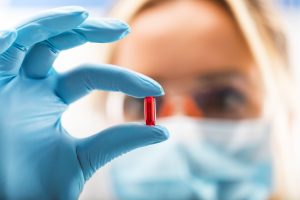Precision medicine is no buzzword. It’s a reality, impacting lives and improving medical care in a growing number of settings.
When it comes to cancer treatments, precision medicine’s ability to match patients with the most effective treatment for their genetic makeup, medical history and environment is making a big difference in patient outcomes and the development of new treatments and drugs that have the power to change how we view a cancer diagnosis.
The National Cancer Institute provides an example from The Cancer Genome Atlas in the form of the breast cancer drug trastuzumab (Herceptin), which works only for women whose tumors have a particular genetic profile known as HER-2 positive. By taking a precision medicine approach, doctors and researchers have found new, effective treatments for specific genetic mutations of cancer and now are developing tools to attack the disease on a more personalized level, through information specific to each patient.
But beyond cancer treatment, there is a growing sense of wonder about what else precision medicine can do in the broader spectrum of medical care. Its impact is now being considered for a variety of chronic conditions, but it’s already being applied to a few that are certain to grab your attention.
Precision medicine is applicable to any disease but answering some of medicine’s toughest questions and helping practitioners match treatments that best address a patient’s specific needs is particularly important when it comes to these common conditions.
Alzheimer’s and Dementia
The Obama administration announced the Precision Medicine Initiative in 2015. The next two years were highlighted by precision medicine innovations in cancer research. In 2017, belief in precision medicine’s potential to spread to the world of Alzheimer’s research took off. A quick Google search on the topic will reveal a slew of research papers and articles published that year exploring how the approach might be applied to Alzheimer’s research.
Bill Gates added to the momentum in November 2017 with a $50 million donation to the Dementia Discovery Fund to “diversify the clinical pipeline and identify new targets for treatment,” as he wrote on the gatesnotes blog. Gates noted five areas he earmarked for progress:
- Better understanding of Alzheimer’s progression: Understanding of the disease has come primarily through autopsy to this point, providing only a glimpse of how it effects the brain in the later stages. A better understanding of its progression over time is needed to better understand the causes and why it impacts various populations differently.
- Earlier detection and diagnosis: Difficulties diagnosing Alzheimer’s make it hard to stop its early progression. If precision medicine can help researchers find more reliable, accessible and affordable methods for diagnosis, it will go a long way toward making drug and treatment research more effective.
- Examination of more approaches: Treatments to date have primarily targeted specific proteins that cause plaque and tangles in the brain. Diversifying drugs and supporting more exploratory theories about Alzheimer’s with one foot rooted in precision medicine could lead to key discoveries.
- More clinical trial participants: The ability to innovate new treatments is heavily based on researcher’s ability to perform clinical trials. Precision medicine has an important role to play in identifying potential candidates for treatment at early stages of the disease’s progression and creating a process where participants are pre-qualified and put into a registry.
- Better use of data: Common data structure across trials and making the most of it, especially data that already exists, will help precision medicine efforts take off more quickly and aid researchers in finding patterns and creating new treatment pathways.
Risk assessment for Alzheimer’s is a big area of opportunity for precision medicine. Examination of genetic risk is obviously important, but another area which is more difficult to assess, and where the precision approach could yield results, is environmental factors. Understanding gene-environment interactions can help identify high risk cases with even greater accuracy and could give providers something to keep an eye out for if a patient begins to show symptoms.
According to an article from the Annals of Translational Medicine, patients who have suffered a traumatic brain injury or cerebrovascular events have increased risk of dementia. Precision medicine can help physicians identify those with a greater risk of dementia, intervene sooner should symptoms begin to present themselves and possibly match them to a clinical trial or treatment that is targeting their specific population, such as African American males who have suffered a traumatic brain injury.
Depression
The World Health Organization estimates that 300 million people around the world suffer from depression, making it one of the most common forms of mental illness.
One reason for that number is that depression is difficult to treat. While precision medicine could help create new and innovative approaches to treating depression, breaking down depression into neat categories with clear solutions is a tall task.
An article from STAT examined the complexities of mapping a heterogenous condition such as depression, calling it “difficult for the same reason it would be useful” since depression varies so drastically between patients. Some researchers believe identification of depression’s effect on neural circuitry and genome sequencing to identify mutations of depression will help them identify subtypes of the condition.
Meanwhile, there’s another school of thought that believes searching for biomarkers in blood may be more useful. And, like any endeavor of this sort, there are those who believe that none of this will work given the previously mentioned polygenic nature of depression, meaning it would have thousands of different genetic variations combining in different ways with different environmental conditions to create an array of possibilities that is truly impossible to understand.
But precision medicine’s ability to crack this code piece by piece could be supported through long term studies that follow patients over a number of years to tell more complete stories. While it remains to be seen what effect this more personalized approach will have on broader treatment methods, there is plenty of optimism regarding what precision medicine research could yield in terms of information about depression and the effect it could have on at least some patients.
Personalized Diets
The glycemic index measures carbohydrates in food and how they are expected to impact an individual’s blood sugar levels. While it is a useful tool for dieticians and physicians alike, its predictions do not always prove accurate to the individual.
With diabetic patients, foods that cause significant rises in blood sugar levels vary from person to person. Using blood glucose trackers and diet tracking has shown the potential to gather data that can help computer scientists develop algorithms capable of designing custom diets based on blood sugar responses.
Already, this is resulting in the rise of a new industry, personalized nutrition testing services. NPR profiled a company called Habit, which asks participants to take blood and DNA samples before and after drinking a high fat, sugar laced test drink. The results can show if an individual needs a diet heavier in one nutrient than others, such as protein, and uncover genetic information such as sensitivity to caffeine.
Precision medicine’s approach to looking at environment and the whole picture of a patient’s life can yield far more than just genetic information which, according to the NPR article, only reveals about 10% of risk related dietary diseases such as diabetes. The rest comes down to environment and behavior.
For those already suffering with the condition, however, this sort of research has the potential to help educate patients and lead to them living healthier lives through a personalized diet that takes into consideration the entire picture of their life.




